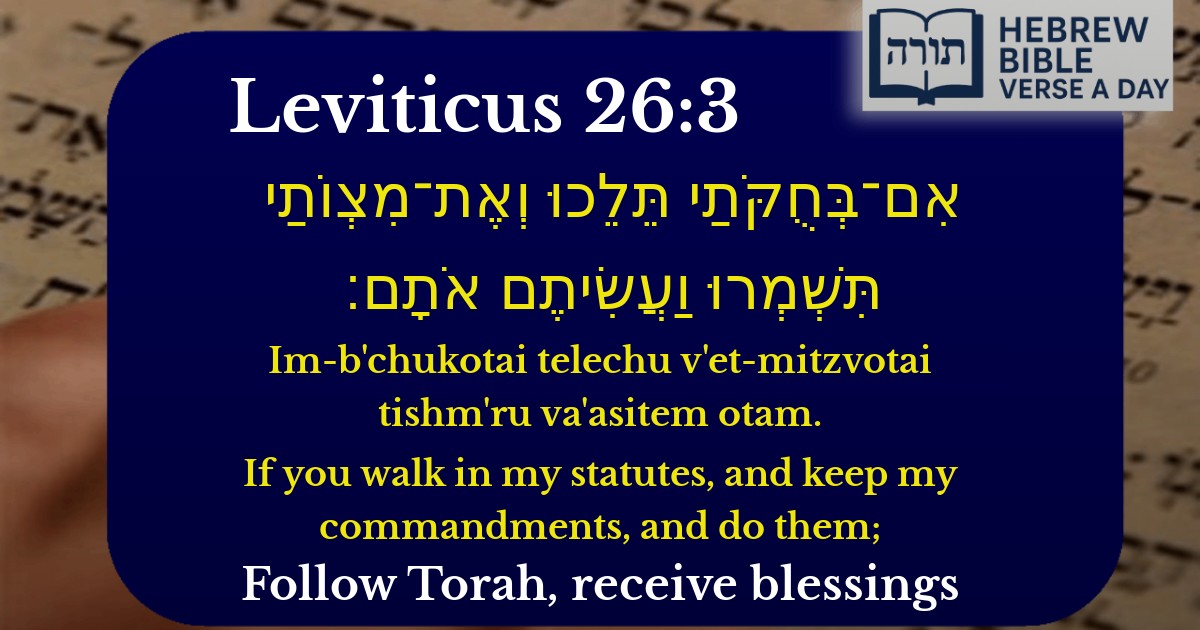Join Our Newsletter To Be Informed When New Videos Are Posted
Join the thousands of fellow Studends who rely on our videos to learn how to read the bible in Hebrew for free!
Hebrew Text
אִם־בְּחֻקֹּתַי תֵּלֵכוּ וְאֶת־מִצְוֺתַי תִּשְׁמְרוּ וַעֲשִׂיתֶם אֹתָם׃
English Translation
If you walk in my statutes, and keep my commandments, and do them;
Transliteration
Im-b'chukotai telechu v'et-mitzvotai tishm'ru va'asitem otam.
Hebrew Leining Text
אִם־בְּחֻקֹּתַ֖י תֵּלֵ֑כוּ וְאֶת־מִצְוֺתַ֣י תִּשְׁמְר֔וּ וַעֲשִׂיתֶ֖ם אֹתָֽם׃
אִם־בְּחֻקֹּתַ֖י תֵּלֵ֑כוּ וְאֶת־מִצְוֺתַ֣י תִּשְׁמְר֔וּ וַעֲשִׂיתֶ֖ם אֹתָֽם׃
🎵 Listen to leining
Parasha Commentary
📚 Talmud Citations
This verse is quoted in the Talmud.
📖 Avodah Zarah 5a
The verse is referenced in a discussion about the rewards for observing God's commandments and the consequences of neglecting them.
📖 Sotah 21a
The verse is cited in the context of discussing the merit of studying Torah and fulfilling commandments, emphasizing the importance of both learning and action.


Understanding the Verse
The verse (Vayikra 26:3) begins with the conditional phrase "If you walk in My statutes", setting the stage for the blessings that follow. The language is structured in three parts: walking in Hashem's statutes, keeping His commandments, and doing them. Each phrase carries distinct meaning according to traditional Orthodox Jewish commentators.
Rashi's Explanation
Rashi explains that "If you walk in My statutes" refers not merely to observing the mitzvos but to toiling in Torah study with great effort (she-tihyu ameilim ba-Torah). The term "walking" implies continuous movement and growth in Torah learning, not just passive observance. This aligns with the Talmudic principle (Avos 5:21) that Torah study is the foundation of mitzvah observance.
Rambam's Perspective
Rambam (Hilchos Talmud Torah 3:12) emphasizes that the verse underscores the importance of both study and action. "Keep My commandments" refers to safeguarding the mitzvos from neglect, while "do them" signifies actual performance. The sequence teaches that proper observance requires first understanding the mitzvos through Torah study.
Midrashic Interpretation
The Toras Kohanim (Sifra) notes that the verse uses three expressions to highlight different levels of commitment:
This threefold structure mirrors the triad of Torah, avodah (service), and gemilus chassadim (acts of kindness) that uphold the world (Avos 1:2).
Chassidic Insight
The Sfas Emes teaches that "walking" in Hashem's statutes implies constant spiritual progression. The mitzvos are not static obligations but pathways to elevate one's connection to the Divine. The repetition of "doing them" suggests that mitzvos must be performed with both physical action and spiritual intent (kavanah).